|
Biographical Log of Michael Furstner - Page 149
08 | 09 ||
2010 :
Jan |
Feb |
Mar |
Apr |
May |
Jun |
Jul |
Aug |
Sep |
Oct |
Nov |
Dec || Page :
Previous |
Next
The Martinshof Story -
A Philosophy of Happiness -
Life Awareness -
Maps & other Text series
Most Recent -
Next -
Previous -
Page 1 -
Photos -
Index -
Topics -
MP3s -
Jazclass Links
Sunday - Tuesday, March 21 - 23 2010
(diary, bridge, Richard Dawkins)
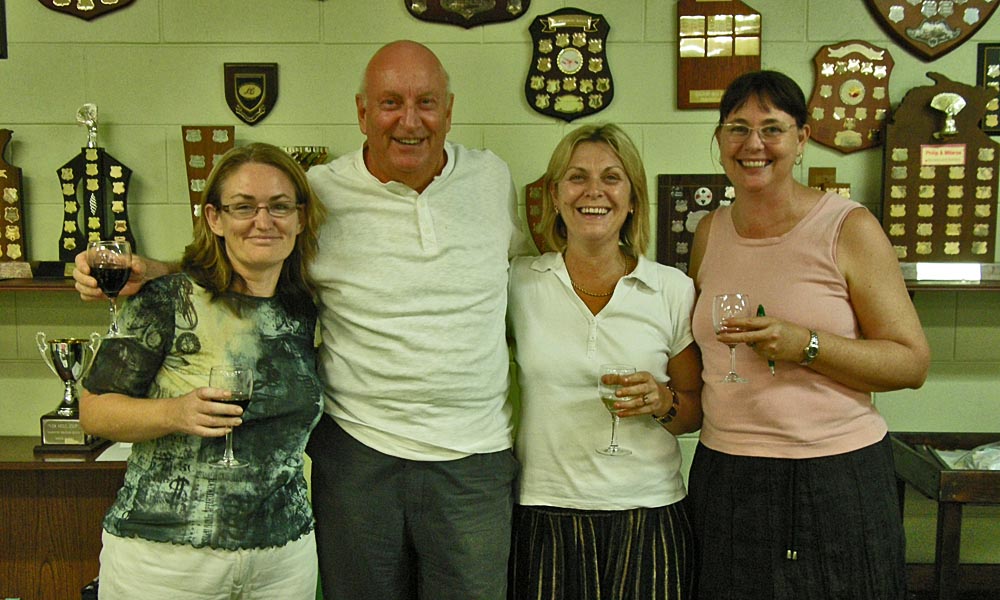 On Sunday I went to the Stokes Hill Wharf for lunch. The Dinah Beach Sailing Club was
running one of their last races of the season and there were lots of yachts on the
water, starting the race as I arrived.
On Sunday I went to the Stokes Hill Wharf for lunch. The Dinah Beach Sailing Club was
running one of their last races of the season and there were lots of yachts on the
water, starting the race as I arrived.
Looking back I am pleased having been
involved in running such races for 6 years at the Darwin Sailing Club, but I am also
glad to be out of it now.
Monday the first session of the Arafura Bridge Club GNOT heat. There are 8 teams
and we do quite well, finishing 3rd behind two strong teams.
Afterwards there is
quite some talk and commotion about a Small Slam (bidding and making 12 out of
the total 13 tricks) I bid and made against the strongest team present. It was the only
Slam bid of the evening and no other team had spotted and bid it. Contrary to some of
the comments it was not a difficult or risky bid to make. There appears to be a rather
disappointing trend in competitive Duplicate bridge these days to go for safety
all the time and Slam contracts are almost entirely off the radar for most. Over the
past week Mairead and I bid and made four Slam contracts, not bid by anyone else.
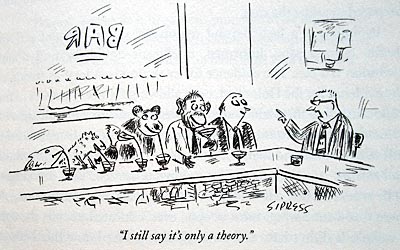 Tuesday : I am on a healthy diet these days, by eating more salad. The
Upper Crust sandwich bar in the Palmerston Shopping Centre make great salads
with a piece of fish or chicken on the side which I have for lunch most days now.
Tuesday : I am on a healthy diet these days, by eating more salad. The
Upper Crust sandwich bar in the Palmerston Shopping Centre make great salads
with a piece of fish or chicken on the side which I have for lunch most days now.
Afterwards I check out some books at the Palmerston Library, and have an Iced Coffee at
the Bistro there.
Yesterday I picked up a couple of books by Douglas Adams
(from "The Hitch hikers Guide to the Galaxy" fame), raved over by many intelligent
readers, but I can't really get into them. They are funny for a bit but too artificial
to my taste. I have never been into Science Fiction, I prefer the real thing every time.
And that is what I do find today : The Greatest Show on Earth, the most recent
(2009) book by Richard Dawkins. As usual ("The God
Delusion", "The Selfish Gene", "A Devils Chaplain", etc.) : hard hitting, intelligent,
hugely informative and a great read.
Dawkins' books are not just about recreational reading. They are at the very
forefront of the battle against ignorance which still prevails in even the
Developed World today.
Two recent polls (2008 Gallup poll in the USA and the 2006
MORI poll in Britain) have revealed the considerable difference in enlightenment or lack
thereof between Britain and the USA.
- The evolution theory says that human kind has
developed over millions of years from less advance forms of life. God had
no part in this process.
48% of Britons agree with this statement, while only 14% agree with it in the
USA.
(36% of Americans believed in the Evolution theory, but also that God did
have a part in it.)
-
The creationism theory says that God created human kind pretty much in
his/her present form at one time within the last 10,000 years.
22% of Britons agree with this statement, while 44% agree with it in the USA.
While Britain and (as additional European polls reveal) especially Northern Europe are
clearly in the lead towards greater enlightenment, we have a long long way to go, and
the present ground swell of history denying creationists (with their stronghold in
the USA) is very worrying to say the least.
Most Recent -
Next -
Previous -
Top -
Page 1 -
Photos -
Index -
Topics -
MP3s -
Jazclass Links
Wednesday & Thursday, March 24 & 25 2010
(diary, entropy)
Awareness 30 continues from March 19, 2009
Entropy (I quote from Brian Greene's book "The Fabric
of the Cosmos")
is a measure of disorder in a physical system. High entropy means that
many rearrangements of the ingredients making up a system would go unnoticed, and this
in turn means the system is highly disordered.
Low entropy means that
very few rearrangements would go unnoticed, and this in turn means the system is highly
ordered."
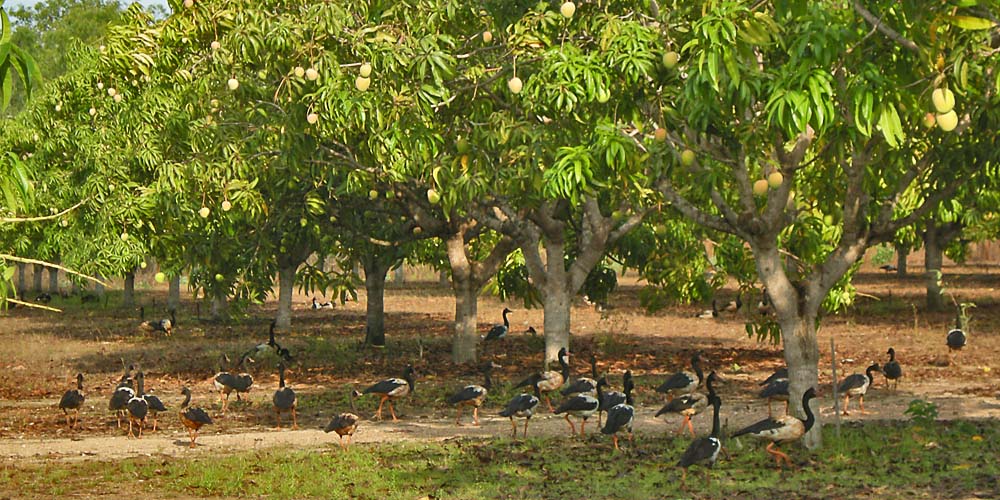 On this photograph for example,
the mango trees are neatly aligned in a straight line and spaced at equal
intervals. It represents a system of low entropy, because if one tree was
removed and placed say halfway between this row and the next, it would immediately catch
our attention.
On this photograph for example,
the mango trees are neatly aligned in a straight line and spaced at equal
intervals. It represents a system of low entropy, because if one tree was
removed and placed say halfway between this row and the next, it would immediately catch
our attention.
The geese underneath the trees, on the other hand, represent a system of high
entropy. Taking one of them away and placing it somewhere else, would largely go
unnoticed.
If there were only two or three geese present underneath the trees, taking one away or
shifting it to another spot would of course draw immediate attention. So the more
ingredients (geese) a system has, the greater potential it has for high entropy.
In physical systems with many constituents (I quote Greene again), there is a natural
evolution towards greater disorder, since disorder can be achieved in so
many more ways that order. In other words, physical systems tend to evolve toward states
of higher entropy.
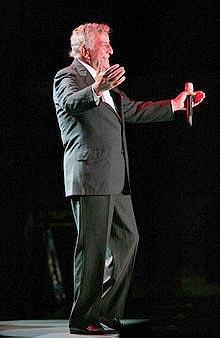 Here I leave Greene and follow my own (non physical, layman's) thoughts on this
interesting topic, making no apologies if I apply it perhaps somewhat broader than
science would have intended.
Here I leave Greene and follow my own (non physical, layman's) thoughts on this
interesting topic, making no apologies if I apply it perhaps somewhat broader than
science would have intended.
Curiously, where nature tends to evolve towards greater entropy, we humans try to
do the opposite, creating low entropy order whenever we can, because order,
"straight thinking", logic, is very much our thing.
Scientists look at a high
entropy situation and trace it back to its initial low entropy state and to the rules
by which it is governed. And we have done a marvelous job. Look at the abundance of life
forms all around us today, and we can trace it now back to its very beginning : the
simple joining of two primitive cells.
We walk through a natural forest and there is high entropy all around us. Trees grow
where seeds have fallen, blown at random by the wind, or carried within birds until
discarded in their droppings. Enter a pine forest plantation or fruit farm and there is
nothing but straight lined trees, low entropy, because it makes sense for maintenance and
harvesting.
The legendary Jazz singer Tony Bennett once
said in a TV interview : "There are no straight lines in nature."
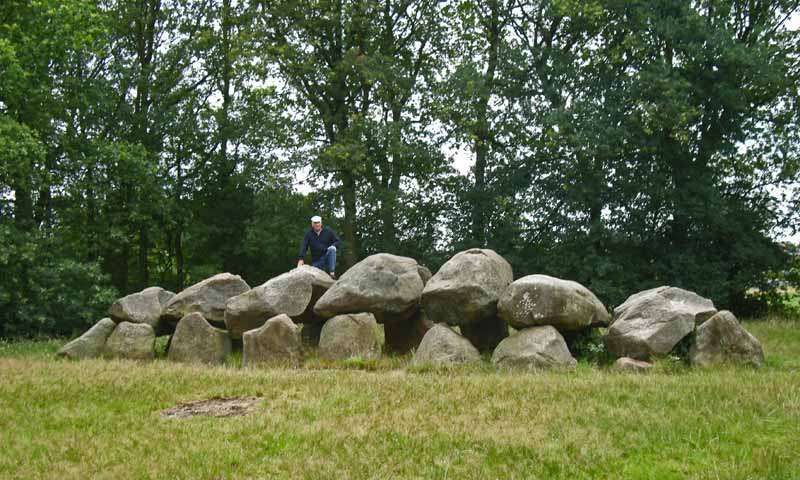 And I believe he is right. Think of a line as being a series of perfectly aligned
interconnected dots, a system of very low entropy. Would not last very long in nature!
And I believe he is right. Think of a line as being a series of perfectly aligned
interconnected dots, a system of very low entropy. Would not last very long in nature!
Wherever man goes he leaves a low entropy foot print, the Dutch hunnebedden in the Northern province
of Drenthe are a perfect example. A bunch of large granite boulders strewn around naturally at random
would draw no attention whatever, but used to construct a grave and bingo a human low
entropy foot print is left behind for thousands of years.
When walking through the bush in outback Western Australia as a geologist during
the Nickel boom (1968) I would marvel at the untouched wildness of the place. Then
suddenly amongst the rubble strewn everywhere around me I notice a three or four flattish
stones, perhaps 20-25 cm (8-10 inches) wide, placed on top of one another. A
marker for a mineral claim boundary, a survey point. A low entropy human foot print, in
the middle of a millions of years old high entropy expanse.
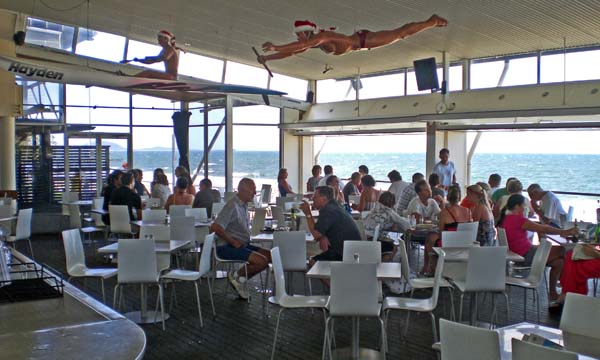 From childhood onwards we are taught : order, by our parents, at school, at work,
in the army. When finished eating (as a child) and leaving the table you place your
chair back properly where it belongs, to restore low entropy. It is still with me,
strongly, I judge people by it !
From childhood onwards we are taught : order, by our parents, at school, at work,
in the army. When finished eating (as a child) and leaving the table you place your
chair back properly where it belongs, to restore low entropy. It is still with me,
strongly, I judge people by it !
In the Mooloolaba Surf
Club the staff do a great job, neatly arranging tables and the chairs around them.
Empty plates and glasses are removed immediately. A very aggreeable low entropy environment. Some people
enter the Club, sit down have their meal, carelessly shove their chairs back and walk out. Low
entropy destroyed. I am annoyed and judge : no education, blunt, careless, oblivious to the comfort of others,
little awareness.
I believe that composition (the pleasing arrangements of objects) too is an
expression of human's intuitive sense for low entropy. Some of course possess this sense more than
others.
My father would marvel at my mother. Every time she entered the lounge room,
she would, intuitively, almost unconsciously, move an ornament on a table here, rotate a
vase with flowers slightly there, as she walked past it. "It is all perfect again", my
father would sigh.
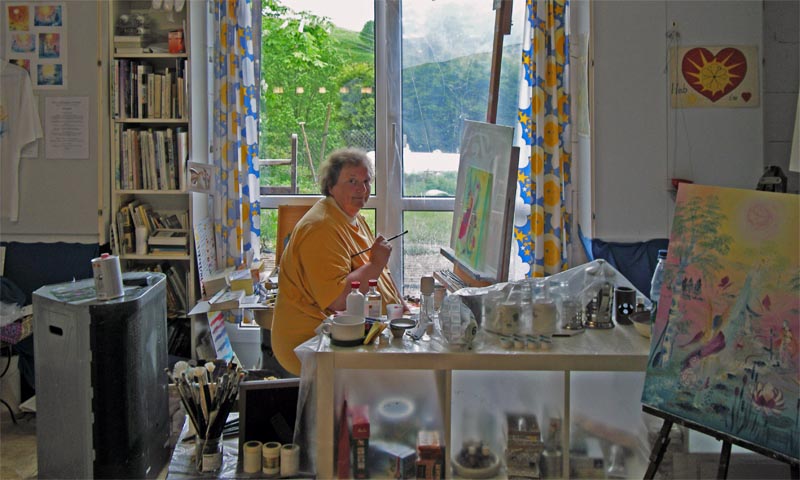 My sister Wivica was in her earlier years an specialist
interior decorator consultant for fashionable jewelry shops throughout Europe.
My sister Wivica was in her earlier years an specialist
interior decorator consultant for fashionable jewelry shops throughout Europe.
When she
applied for the job she was given by her interviewer an object which she was asked to
place on a large rectangular table. After Wivica had done that, the interviewer took out
a tape measure, and measured the exact position of the object with respect to the sides of
the table. "Perfect" he said, "the Golden
Cut, spot on!
What does this mean? For human perception even a single object seen
within a spacial context (a table, a landscape, etc.) there are only a few low entropy
("just right") positions. In contrast there are lots of "wrong" positions, high entropy,
because it does not matter where the object is placed then.
Comments -
Most Recent -
Next Page -
Previous -
Top -
Page 1 -
Photos -
Index -
Topics -
Jazclass Links
Copyright © 2010 Michael Furstner
|






